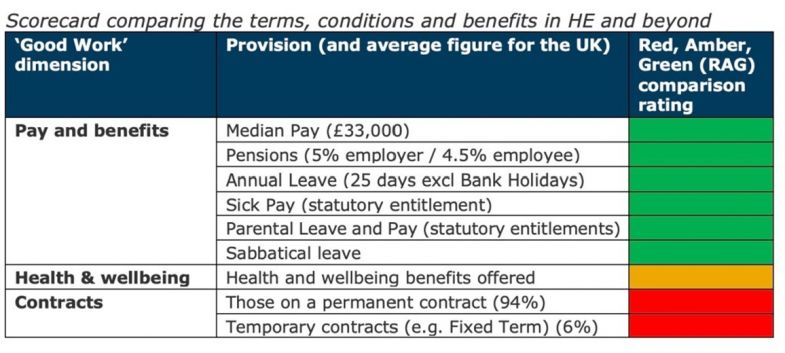UK academics enjoy better pensions, annual leave entitlements and other benefits than those in comparative sectors but lose out when it comes to precarity and pay gaps, a new analysis has found.
The Higher Education Policy Institute (Hepi) and SUMS consultancy conducted a comparative study of academics’ pay and conditions in the context of several years of industrial action in which there have been repeated demands for higher pay and a reversal of cuts to pension benefits.
The study – published on 25 May – shows that, at £47,300, the average salary of higher education teaching professionals is higher than the £38,281 earned on average by colleagues in further education.
It is also higher than the overall 2022 median annual pay of £33,000 for full-time employees and the pay of professions such as nurses, therapists and midwives.

Academics earn a similar amount to architects, veterinarians and engineers but less than specialist medical practitioners, barristers and judges, the study finds.
“The results show a nuanced picture,” said Hepi director Nick Hillman. “On the areas that have been most associated with the recent industrial action – pay and pensions – academics compare well to those in other professions. Generous occupational pension schemes of the sort that disappeared years ago for most staff in the private and charitable sectors remain the norm in academia.”
“However, the evidence also confirms that academics score poorly on wellbeing and mental health, with excessive workloads and expectations commonly having a detrimental impact on their lives,” he added.
The report finds, on average, academics are entitled to sick pay that is 13 times more generous than the statutory minimum and, at 21.6 per cent of salary, employers’ contribution to pensions run by the Universities Superannuation Scheme is four times more generous than the average employer pension contribution of 5 per cent. Those in the Teachers’ Pension Scheme receive a higher employer contribution of 23.7 per cent.
Other benefits for academics include 33 days annual leave compared with 25 days on average for UK employees, increased access to sabbaticals and more generous sickness and parental leave entitlements.
Mr Hillman said the report's “most important finding is that the expense of the extra benefits enjoyed by academics on permanent contracts come at the cost of younger staff at an earlier stage in their careers, who can struggle to move on up.”
The report highlights a still “considerable” gender pay gap of 13.7 per cent in academia - compared to 14.9 per cent nationally - and a “huge lack of representation of people with minority ethnic backgrounds in the higher echelons of universities”.
Most starkly, higher education lags behind the rest of the country in terms of precarious employment, with 67 per cent of academics employed on permanent contracts, compared with 94 per cent in the labour market as a whole.
“Those on both sides of the recent industrial disputes in higher education would do well to reflect on what more can now be done to tackle precarity in higher education”, said Mr Hillman. “On the basis of this research, that looks like it may well be a more urgent priority than forever protecting gold-plated pensions against all change.”
Reacting to the report's publication, Raj Jethwa, the chief executive of the Universities and Colleges Employers Association (Ucea), said it highlighted the “often-overlooked benefits of working in HE when benchmarked against those in other sectors” and the progress being made on reducing the use of zero-hours contracts and gender pay gaps.
But Jo Grady, the general secretary of the University and College Union, said higher education was still marked by pay falling in real terms, insecure contracts and worsening conditions.
“Every employment benefit university staff are able to enjoy has been won not given, and trade unions will not indulge a race to the bottom which pits one set of workers against another,” she said.
POSTSCRIPT:
Print headline: UK academics’ benefits better than most
Register to continue
Why register?
- Registration is free and only takes a moment
- Once registered, you can read 3 articles a month
- Sign up for our newsletter
Subscribe
Or subscribe for unlimited access to:
- Unlimited access to news, views, insights & reviews
- Digital editions
- Digital access to THE’s university and college rankings analysis
Already registered or a current subscriber? Login








